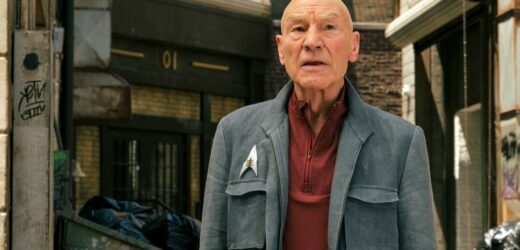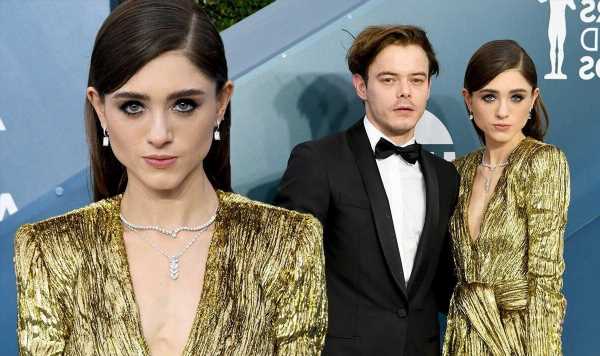SPOILER ALERT: This story discusses major plot developments in Season 2, Episode 10 of “Star Trek: Picard,” currently streaming on Paramount+.
Throughout the seven seasons of “Star Trek: The Next Generation,” audiences were only allowed brief glimpses into the past of Capt. Jean-Luc Picard (Patrick Stewart), but Season 2 of the Paramount+ series “Star Trek: Picard” cracks the childhood of its titular character wide open. By the season finale, we learn that Picard’s mother, Yvette (Madeline Wise), struggled with mental illness and ultimately took her own life — something Picard has felt guilty for causing his entire life.
In Season 2, Picard is forced to confront those feelings after his old antagonist Q (John de Lancie) — an omnipotent being capable of changing the universe to suit his own whims — sends Picard and his compatriots on a time-traveling adventure back to Earth in 2024. By the finale, Picard has come to terms with his trauma, and he and Q share a surprising moment of tender friendship before parting ways as Q’s existence expires forever.
Because this is a “Star Trek” show, along the way Picard’s friend Agnes Jurati (Alison Pill) winds up melding her consciousness with the Borg Queen (Annie Wersching) and transforming herself into a new, benevolent Borg Queen — a storyline that concludes Pill’s time on “Picard,” as Stewart confirmed in an interview with Variety. He also discussed why he was skeptical at first about reuniting with the rest of the “Next Generation” cast for the third and final season of “Picard,” and whether he would ever take on the role of Jean-Luc again.
How did you arrive at the idea that Picard’s mother lived with mental illness and that ultimately, Picard felt responsible for her suicide?
That was actually something that had been in my head for quite a long time. I knew that there had been some kind of trauma. There had been hints and suggestions. So these might have only been in the writers’ room, you know, where people would talk about this kind of thing then. But to have the opportunity to have revealed the actual truth of what his childhood was like and how he had distorted the story in order to protect himself — I was brought up in a somewhat violent background, too, and I know how important it is to find reasons why things are happening. And sometimes to take responsibility for why they’re happening, too.
Picard also says goodbye to Q in a surprisingly touching scene between them. What was that like to play?
I watched the episode this morning at seven o’clock. And it had moved me as Episode 9 had done, but this time, much, much more. The scenes with John de Lancie were very intense, but because I think we both we have great respect for one another and the work that we do, there was always a feeling of vulnerability about the scenes with Q. Sometimes Q was tiresome and sometimes he was threatening, and there was a feeling he could be violent. To have the relationship resolved as it was, was very potent, I thought, and the work that John did was extraordinary. There was no question that it was still Q, and it was a Q that we’d seen for over 30 years — but a changing man, and a man who had decided that he could safely reveal himself and who he really was. I found that very emotional.
And then the final moments with Alison Pill, which I also knew were going to be her final moments in the series — which made me very, very sad, because she is an outstanding actress. But what she did with those last moments, when she was revealed — when the Borg mask came away from her face, I found touched me very deeply this morning.
It was great to see that the cast of “The Next Generation” is returning for Season 3. Will they be in every episode? Should we expect them to be series regulars?
That is a question I can’t answer, Adam. But every single one of my leading colleagues from “Next Generation” will be in Season 3 at different times. It was something which initially, I had my doubts about. It would seem to me that it would be paying too much attention to the fan appreciations of what “Next Generation” had meant to them. I know how intense the social reconnections can be. But when we talked about it, when I talk to Akiva [Goldsman] about it and my fellow producers and the other writers, I could see that it could be done without rewinding the clock. There was no reason for us to walk down memory lane in every scene. Not at all. And the brilliant thing the writers did in Season 3, is that they engaged the cast of “Next Generation.” But that’s as much as I’m allowed to say.
My understanding is that you shot Season 2 and 3 concurrently, and you’re already done filming Season 3?
We are. I think we wrapped about five weeks ago, and I’m still recovering from it. It was very intense. We filmed the 10 episodes of Season 2 and wrapped it at about seven o’clock in the evening, and began Season 3 at seven o’clock the next morning. And it was like that for about 13 months, I think. Longer than a year, I know that.
How does it feel to be finished with the show?
It feels very satisfactory. My fear was that it would become a sentimental retreat back to the storylines and the people of “Next Generation.” But it didn’t. In a speech to the four people who first pitched to me in a hotel meeting room their ideas for a series with Jean-Luc Picard as the central character, I had said, “I’m here only to tell you to your faces, because you’re all such fine people, that I can’t do this. It’s not right for me to attempt to be Jean-Luc Picard again.” And then they said, “Well, you know, how long has it been?” I said, “Well, from Episode 1, it’s been over 30 years. And I don’t want to go through all of that day by day again.” They said, “But what if all the characters had also lived through those 30 years? And so we were in a different world than the one that we’ve seen in the last episode of ‘TNG’ around the poker table. What if everybody was, in some sense, different and changed, that the world had had an impact, which was sometimes unexpected, but always interesting?” I was engaged from the very, very beginning with the scripts, and I didn’t feel as if I was just going over old territory and doing everything that I’d done before. Not at all.
So what do you feel you learned about Jean-Luc Picard through this show that you hadn’t known before?
That he was hiding, I think. And that, in a sense, his fear about his vulnerability and the accusations that he internally, mentally was making of himself for his behavior as a child was fascinating. To explore that 30 years after I first put on the Star Trek uniform was an intriguing acting experience. And I’ve mentioned this once before, in Episode 10, and a little bit in Episode 9, my voice doesn’t sound like my voice because I’ve been breathing in smoke from the set. Cinematographers love to use atmos, it’s called, and it creates wonderful pictures. But it gets on my vocal cords and I get hoarse sounding. So I was a little hoarse all the way through episode 10 of season 2. But I came to love it, because it was not the authoritative, commanding voice of the Jean-Luc that we had heard from all those years and those four movies. And I was grateful that that had happened to me, I could make use of it.
Would you ever play Picard again?
I think that Picard has said his last sentence and given his last look at his colleagues. I think the way we close Season 3 is perfect. Perfect. It makes me emotional each time I think of it, but it’s great.
This interview has been edited and condensed.
Source: Read Full Article


